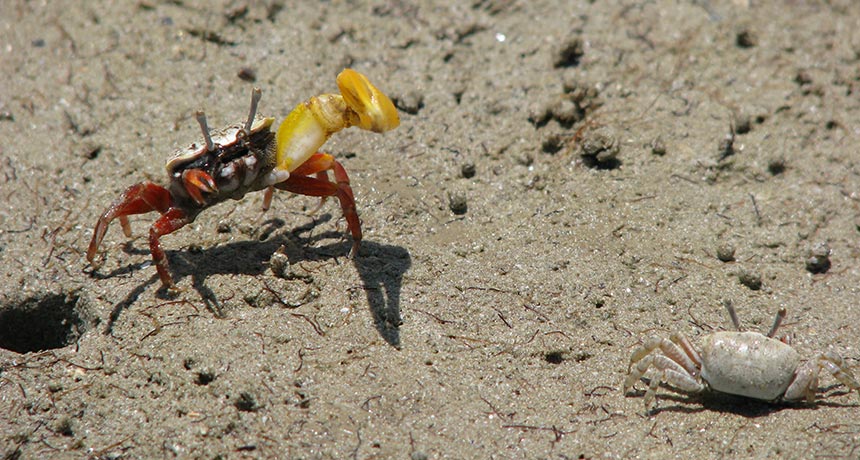Sneaky male fiddler crabs entrap their mates

Among people, a man stepping aside to let a woman pass through a door first is seen as a gentlemanly — if a bit old-fashioned — act. Among banana fiddler crabs, though, this behavior is a trap — one that lets a male crab coerce a female into a mating she may not have preferred.
To catch the attention of a female and lure her into his burrow, a male banana fiddler crab stands outside the entrance to his cave and waves the larger of his two claws. A female will look him over and consider his size, the color of his claw and how he’s waving it. If she likes what she sees, she’ll approach him. She might decide to enter his burrow and check it out, and once inside, she might stick around for mating if she thinks that the burrow has the right conditions for rearing her embryos.
When a female approaches a male and his burrow, most males enter first, letting their potential mate follow him down. But many male crabs take another approach, stepping aside and following her into the lair — letting a male trap the female inside and mate with her, researchers report June 15 in PLOS ONE.
Christina Painting of the Australian National University in Canberra and colleagues observed banana fiddler crabs in Darwin, Australia, during two mating seasons, watching what happened as males waved their claws and females made their choice. When a female was interested in a male, the guys entered the burrow first 32 percent of the time. While females were more likely to enter a burrow if a male entered first (71 percent versus only 41 percent when the guy stepped aside), the trapping strategy was more successful in getting a mating out of the meeting. When the male followed the female in, 79 percent of females stuck around the mate. But waiting for her to follow resulted in a pairing only 54 percent of the time.
“The results strongly suggest that entering a male’s burrow first reduces the probability that a female will leave the burrow after sampling it since females are effectively trapped underground in the narrow burrow shaft when the male follows her in,” the researchers write.
So why would a female ever enter a burrow first if there were the possibility that she would be trapped inside and coerced into mating? Perhaps this might give the female a chance to test the male’s strength, the researchers suggest. If she can successfully fight her way out, then the male was obviously not worthy of her attention. Or it is possible that this is just a type of courtship behavior in which no coercion is actually happening. It’s difficult to know exactly what’s going on underground.
This isn’t the first time that the males of a fiddler crab species have been found behaving in what we might consider an ungentlemanly fashion. Males of other species have been found trapping, herding, startling and capturing females in their attempts to coerce a mating. And some male sand bubbler crabs, the researchers note, have even been found behaving somewhat like pirates of the sand-mud flats: Males have been spotted capturing female crabs, carrying them back to their burrows and forcing them into their underground lairs for mating.